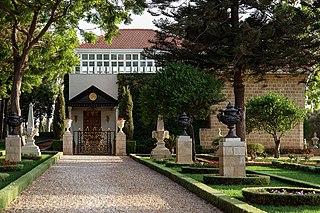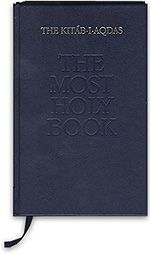
In the Bahá'í Faith the Qiblih is the location that Bahá'ís should face when saying their daily obligatory prayers, and is fixed at the Shrine of Bahá'u'lláh, near Acre, in present-day Israel; approximately at 32°56′37″N35°5′30.5″E.
Riḍván is a twelve-day festival in the Bahá'í Faith, commemorating Bahá'u'lláh's declaration that he was a Manifestation of God. In the Bahá'í Calendar, it begins at sunset on the 13th of Jalál, which translates to the 20th or 21st of April, depending on the date of the March equinox. On the first, ninth and twelfth days of Ridván, work and school should be suspended.
The Hands of the Cause of God, Hands of the Cause, or Hands (informally) were a select group of Bahá'ís, appointed for life, whose main function was to propagate and protect the Bahá'í Faith. Unlike the members of the elected institutions and other appointed institutions in the Bahá'í Faith, who serve in those offices, Hands are considered to have achieved a distinguished rank in service to the religion.
Spiritual Assembly is a term given by `Abdu'l-Bahá to refer to elected councils that govern the Bahá'í Faith. Because the Bahá'í Faith has no clergy, they carry out the affairs of the community. In addition to existing at the local level, there are national Spiritual Assemblies.
Progressive revelation is a core teaching in the Bahá'í Faith that suggests that religious truth is revealed by God progressively and cyclically over time through a series of divine Messengers, and that the teachings are tailored to suit the needs of the time and place of their appearance. Thus, the Bahá'í teachings recognize the divine origin of several world religions as different stages in the history of one religion, while believing that the revelation of Bahá'u'lláh is the most recent, and therefore the most relevant to modern society.
Bahá'í laws are laws and ordinances used in the Bahá'í Faith and are a fundamental part of Bahá'í practice. The laws are based on authenticated texts from Bahá'u'lláh, the founder of the Bahá'í Faith, and also includes subsequent interpretations from `Abdu'l-Bahá and Shoghi Effendi, and legislation by the Universal House of Justice. Bahá'í law is presented as a set of general principles and guidelines and individuals must apply them as they best seem fit. While some of the social laws are enforced by Bahá'í institutions, the emphasis is placed on individuals following the laws based on their conscience, understanding and reasoning, and Bahá'ís are expected to follow the laws for the love of Bahá'u'lláh. The laws are seen as the method of the maintenance of order and security in the world.

A Bahá'í pilgrimage currently consists of visiting the holy places in Haifa, Acre, and Bahjí at the Bahá'í World Centre in Northwest Israel. Bahá'ís do not have access to other places designated as sites for pilgrimage.

The Tablets of Bahá’u’lláh Revealed After the Kitáb-i-Aqdas are selected tablets written by Bahá'u'lláh, the founder of the Bahá'í Faith, and published together as of 1978. The current edition bears the title Fountain of Wisdom: A Collection of Writings from Bahá'u'lláh.
Huqúqu'lláh, sometimes called the Law of Huqúq is a socio-economic and spiritual law of the Kitáb-i-Aqdas, a charter document of the Bahá'í Faith, written by Bahá'u'lláh. In its most basic form, it states that Bahá'ís should make a 19% voluntary payment on any wealth in excess of what is necessary to live comfortably, after the remittance of any outstanding debt. The money is then disbursed to social and economic development projects, or similar philanthropic purposes.
Throughout the Bahá'í writings, future events have been prophesied. The most specific prophecies are related to the rise and fall of leaders and organizations. Most of these prophesies can be found in Bahá'u'lláh's tablets to the kings and rulers of the world and in the Kitáb-i-Aqdas.
The Nineteen-Day Fast is a nineteen-day period of the year, during which members of the Bahá'í Faith adhere to a sunrise-to-sunset fast. Along with obligatory prayer, it is one of the greatest obligations of a Bahá'í, and its chief purpose is spiritual; to reinvigorate the soul and bring the person closer to God. The fast was instituted by the Báb, and accepted by Bahá'u'lláh, the founder of the Bahá'í Faith, who stated its rules in his book of laws, the Kitáb-i-Aqdas. The nineteen days of fasting occur immediately before the beginning of the Bahá'í New Year, on the vernal equinox.
Ayyám-i-Há refers to a period of intercalary days in the Bahá'í calendar, when Bahá'ís celebrate the Festival of Ayyám-i-Há. The four or five days of this period are inserted between the last two months of the calendar. The length of Ayyám-i-Há varies according to the timing of the following vernal equinox so that the next year always starts on the vernal equinox.
The phrase "New world order" in the Bahá'í Faith refers to the replacement of the collective political norms and values of the 19th century with a new system of worldwide governance that incorporates the Bahá'í ideals of unity and justice for all nations, races, creeds, and classes. The idea of world unification, both politically and spiritually, is at the heart of Bahá'í teachings.
Gleanings from the Writings of Bahá'u'lláh is a compilation of selected tablets and extracts from tablets by Bahá'u'lláh, the founder of the Bahá'í Faith. Shoghi Effendi, Guardian of the Bahá'í Faith from 1921 to 1957, made the selection and performed the translation, which was first published 1935.

The Birth of Bahá'u'lláh is one of nine holy days in the Bahá'í calendar that is celebrated by Bahá'ís and during which work is suspended. The holy day celebrates the birth of Bahá'u'lláh, the founder of the Bahá'í Faith. The 2017 date is October 22.
Naw-Rúz is the first day of the Bahá'í calendar year and one of nine holy days for adherents of the Bahá'í Faith. It occurs on the vernal equinox, on or near March 21.
The Guardian is a hereditary office of the Bahá'í Faith that is first mentioned in the Will and Testament of `Abdu'l-Bahá. Shoghi Effendi was named as the first Guardian of the Bahá'í Faith, and future Guardians were to be appointed from among the male descendants of Bahá'u'lláh. However, since Shoghi Effendi died without having named a successor Guardian, no person could be named to fulfill the position after his death on November 4, 1957, and he remains the only individual acknowledged as Guardian of the Bahá'í Faith, but his guidance remains in the written record of his many writings.













